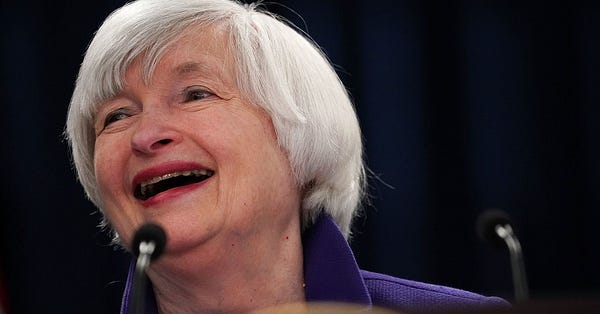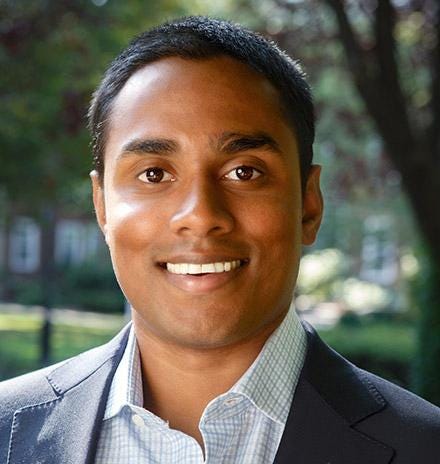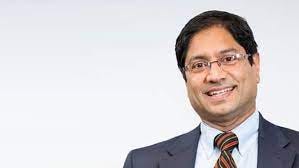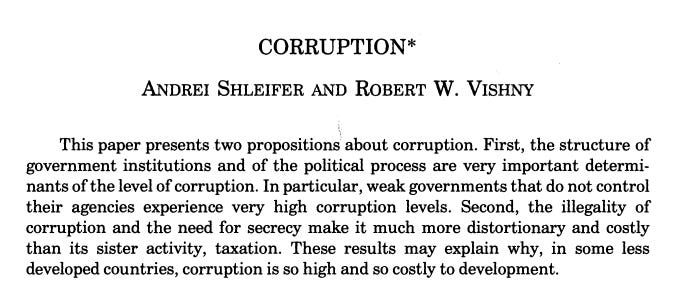I’ve covered dozens of academic scandals — this article covers 10 more quick ones. Each one could probably be worthy of its own self-contained investigative article if I really wanted to milk this content for all it is worth. Which is kind of the point I am driving at here: there is such an infinite, endless ocean of corruption in academia that I can easily afford to give 10 big article ideas away on a whim, and not skip a beat. There will always be more corruption tomorrow.
Most corruption in academia goes unpunished simply because the media has no incentive to cover it since the general public does not care enough for them to justify sinking resources into covering it, so there is very little media coverage, so universities bear no public costs for sweeping it under the rug (sweeping under the rug is almost always the end result). This weird, corrupt equilibrium exists precisely because nobody in the public cares about social science research. When an economist, sociologist, or political scientist engages in research misconduct, it is almost always met with a resounding shrug from the public.
This is where Karlstack comes in: I have carved out a niche and provide value in covering the endless ocean of corruption that the mainstream media has no incentive to cover. Here are just a few of the scandals I have covered this year:
Whistleblower emails reveal partisan rot at Ford Foundation, that gets "nonpartisan" tax perks
MIT cancels Chicago geophysicist lecture under pressure from twitter activists
HARVARD LIE SCHOOL: An Exposé of Corrupt Harvard Law School Administrators
Leaked Email Shows Ford Foundation Using Political Influence to Bully ASU Administration
Frauds in the Duke, Boston, and Stanford Economics Departments
The Economics Profession is Systemically Racist and Sexist (Against Asian Males)
EXCLUSIVE: Leaked Report Shows Harvard Professor Fabricated Data
Woke Mathematicians Are Putting Their Enemies On A Surveillance List
I broke 4 of these stories on Tucker, most recently 2 days ago:

You can help support my war on corruption in academia by signing up for free to my mailing list.
#10: Log(NAICS)
The North American Industry Classification System (NAICS) is a classification of business establishments by type of economic activity. The codes look like this:
This makes Table 10 of the Appendix of the paper Concentrated Capital Losses and the Pricing of Corporate Credit Risk by Emil Siriwardane, a professor at Harvard Business School, so utterly jaw-dropping:
It is hard to overstate how epic this error is. Half of Karlstack's readers are math, finance, accounting, and economics professors, so the error in log(NAICS) is self-evident to them. The other half of Karlstack readers probably haven’t seen log() since high school math class (if at all) and therefore justifiably have no clue what it means.
I will try to explain it as simply as possible. Imagine there was a physics PhD student that thought hydrogen has a greater atomic weight than carbon because H is later in the alphabet than C… and he used this result in his dissertation. Do you think that this chemist would be rewarded with a tenure track job at Harvard chemistry department? Would that chemist be awarded chemistry researcher of the year?
Of course not. It is a testament to how corrupt and useless the field of finance is that Emil was hired at Harvard on the basis of this fraudulent log(NAICS) paper. Other fields, such as medicine, ban such people. Not finance. In finance, such fraud fasttracks you to the inner circle.
HBS chose to hire the guy who was widely known for blatant fraud over every other candidate. Why? Because Emil’s advisor has won a Nobel prize in economics. This gets to the crux of the whole game: finance academia is about prestige and nepotism, not merit.
I want to stress that log(NAICS) is not an 'innocent mistake'. It was deliberate and brazen intellectual dishonesty. Upon being confronted at a UChicago seminar as to why he took log(NAICS), Emil said he would fix the mistake. The next day, he had “fixed” the table.
This is in spite of the fact that the data were restricted to on-site access in Washington, DC. He would’ve had to fly to DC, fixed his code, run the code, and then flew back to Chicago all within the same day.
Upon “fixing” his code from log(NAICS) to NAICS, his results didn’t change — coefficients, standard errors R^2 values — all remained identical. This is the biggest red flag for fabricated data that I could possibly imagine. This is a common theme that I see in my investigations: the cover-up really is always worse than the crime, and always makes the professor look super guilty. Professors are hilariously bad at covering up their fraud.
Proprietary data, of course, so nobody can replicate it.
Maybe the funniest / saddest part of this scandal is how Noah Smith, the golden boy of neoliberal soyboy Twitter (and prolific Substack blogger) reacted. He holds an economics PhD from UMich, he was a finance professor at Stony Brook, he has written about economics for decades, and yet he clearly doesn’t understand the problem with log(NAICS). A finance professor who doesn’t understand what industry fixed effects are… is amazing. Maybe that is why he is a failed finance professor.
#9: Vladimir Putin Plagiarized his Economics PhD
You may be surprised to find out that Vladimir Putin was awarded a PhD in economics in 1997 from the St. Petersburg Mining Institute, with a thesis titled The Strategic Planning of Regional Resources Under the Formation of Market Relations.
The Brookings Institution then found in 2006 that most of this thesis was copied “almost word-for-word” from the 1978 management text “Strategic Planning and Policy,” by University of Pittsburgh professors William R. King and David I. Cleland.
Yeah, that sounds about right.
Putin’s dissertation may be totally plagiarized but fear not! That hasn’t stopped many people in the economics profession from thriving. Maybe after Putin is done with the war in Ukraine, he can co-author a paper with Paul Pinkham-Goldsmith from Yale School of Management:
#8: The Wrath of Tarun Chordia
Bill Schwert is a finance professor at the University of Rochester who retired last year. He was also the managing editor at the Journal of Financial Economics from 1996 to 2021, during which time he accumulated a treasure trove of data on referees in the finance profession. Upon retiring, Schwert released that data to the world and doxxed all the internal JFE referees. Schwert *knew* this was highly confidential information, he *knew* that careers would be ruined. The fact that he did it anyways is deeply, deeply, funny. I am sure he enjoyed every minute of it.
I can only speculate as to his motives. I imagine they are 50% a quixotic plea for an improved refereeing process, and 50% a huge, spiteful middle finger to a corrupt profession as he was walking away. Either way, a legendary retirement stunt.


This data provides a unique glimpse into the publishing process in finance: Eugene Fama's average turnaround, for example, is 4 days, while it takes “Lazy Luigi” Zingales an average turnaround time of 151 days. So, every time you submit a paper to JFE, and that paper is sent to Lazy Luigi to referee, he sits on it for 6 months, thus stalling your carrier for 6 additional months.
The data shows that one outlier, Tarun Chordia, a finance professor at Emory, refereed for the JFE 61 times… and rejected all 61 papers! A 0% acceptance rate with n=61!
Everybody in the profession now hates him for it; this guy's reputation is irreversible in the toilet. Until the day he retires, Chordia will forever be known simply as “that referee guy from JFE.” He is now radioactive — Chordia will surely never be asked to serve as an editor at any important journal. I wouldn’t want to be a co-author of his; it is safe to say his papers will now be rejected out of spite by angry peers. I wouldn’t want to be his PhD student of his; his peers will surely punish the children for the sins of the father.
Brutal. I wonder what could have driven him to reject all 61 papers. Maybe he is a sociopath. We will never know his motivations.
#7: 16 and Pregnant
Melissa Kearney and Phillip Levine caused an uproar 7 years ago when they published Media Influences on Social Outcomes: The Impact of MTV's 16 and Pregnant on Teen Childbearing, which was poorly executed and blatantly ripped off from a slightly different paper. The profession as a whole was genuinely upset that such a shitty, irrelevant, and plagiarised paper was published in the top journal in the world, and it sparked a long discussion thread on EJMR. I feel like a large part of this scandal is simply because Kearney went to MIT and Levine went to Princeton, and it was just so… blatant… that their elite cronyism explains 100% of the reason why this subpar paper is published in the best journal in the world. A rival group of economists later ripped it to shreds. I am surprised it hasn’t been retracted.
Upon being caught committing research misconduct by EJMR, how did Melissa Kearney act? Gracious, humble, and mature? No, in quintessential Karen fashion, she reacted by playing the victim.




Is signing the message "Respectfully, your PhD advisor" a little, well, disrespectful? I would say it is it's clearly bullying.


Let’s get this straight: she commits blatant fraud, plagiarizes a paper, and then blames “sexism” when she is caught. Nobody cares about her gender. People only care about her fraud. The editor who accepted, and then covered up, this fraud, was Hillary Hoynes.
#6: Crooked Hillary
Family Ruptures, Stress, and the Mental Health of the Next Generation is a paper
by Petra Persson ad Maya Rossin-Slater that is a direct ripoff of the almost identical paper Timing of prenatal maternal exposure to severe life events and adverse pregnancy outcomes: a population study of 2.6 million pregnancies, which Petra and Maya would’ve known if they did even a cursory literature review. (Hint: they did know about this other paper, but simply made the choice to actively plagiarize it and not cite it.)
Retraction Watch picked up the story, and here is a 300 page EJMR thread about the scandal. I tried to read all 300 pages but gave up. It emerges in this thread that Hoynes published this paper in the AER because she was close friends and co-authors with the authors.
Upon being caught red-handed, the authors again took zero accountability and instead played the “I have a vagina therefore I should be immune from criticism” card. Maya is mad that EJMR broke the story and exposed her as a fraud, so she plays the victim.





Truly, women were sent to us by God as a test of our faith and patience.
She complains about the mental toll it takes on her. Yes, if you cheat and get called out on your cheating, that takes a mental toll. I would be under mental duress too if I had to live with the fact that I faked my papers and the entire profession knew about it. It would take a huge mental toll on me to know that I am living a lie, to know that I am a cheater who doesn’t deserve the position I have, to know that the only reason I have my job is because of affirmative action. I am sure Maya feels the weight of this all.
Here comes the rage-inducing part. After spending years covering up multiple cases of plagiarism for her friends, Hillary Hoyne then contends that expressing a negative opinion about “defund the police” movements should result in editors being kicked from the profession:


Talk about lack of self-awareness.
The punishment for her years spent blatantly flaunting publishing ethical guidelines? Tenure at UC Berkeley, plus Nancy Pelosi appointed her to a commission on evidence-based policymaking.
“Failing upward” is a common trend in these scandals.

#5: We never caught Paul Krugman’s hacker
Will we ever catch the criminal mastermind who hacked PK’s computer and used it to download child porn?
Let’s hope the FBI can get to the bottom of this “attempt to Qanon me.” Sounds serious.
#4: Bird and Karolyi
Andrew Bird and Steven Karolyi are two (former) professors at Carnegie Mellon whose fraud resulted in a now-deleted EJMR megathread that ended their careers (kind of).
In short, they were caught fabricating results at one journal (TAR) and they were caught red-handed fabricating results at a second journal (RFS). They faked their statistics. The weak response wherein they claim “the copy-editors changed the results without our knowledge” shows intent to deceive… you simply can’t wave your fake results away by claiming that the copy editor messed up his paper. They also ineptly argue that “My laptop crashed and I lost everything” as well as “oh we totally have a replication kit but we just don’t want to release it.” None of these excuses holds water.
There is a nepotism angle here: the editor at one of the journals that contains the fraudulent statistics was Steven Karolyi’s dad, Andrew Karolyi, a professor at Cornell.
Are you proposing that the editor retracts the fraudulent paper of his son?
What's the point then of being the editor?
If you can't get your son jobs and awards, what's the purpose of attaining success?
Since this scandal, Andrew Bird has since failed tenure at Carnegie Mellon and is now an assistant professor at Chapman University. Stephen Karolyi is a more interesting case; he failed tenure at CMU too, left academia, and then popped up as a “senior advisor” at the division of Supervision Risk and Analysis at the Office of the Comptroller of the Currency.
The guy who was deemed too corrupt to be allowed to stay in academia is now in charge of regulating the banking industry. Too perfect, *chefs kiss.*
#3: Seiler and Schiraldi’s Blackmail Scheme
This is an incredible story: two senior/powerful guys teamed up to explicitly blackmail a junior into adding the two of them as coauthors on his AER paper, which just goes to prove the old maxim that an economist would kill his own mother for an AER. Amazingly, the blackmailers in this case were stupid enough to put their explicit blackmail in writing. Here is the infamous email :
Let me be clear about what is going to happen. I have already informally discussed this with my senior colleagues and an editor of a major journal, I am going to write a letter to the editors of the main journals to make them aware of the situation. After this letter, the papers will not be published and in the best scenario the editor in charge will require us to merge or reach an agreement after communicating the whole situation to our head of departments at that point our bargaining position will be very different. At very best this whole process will delay the publication of the papers for years and there is a likely scenario where nothing will be published. As for my point of view having no publication or a minor one it does not make any difference and therefore I will go ahead in writing this letter because I must and will safeguard my own interest at that point.
If you think this is a better outcome for you than reaching now an agreement I cannot force you otherwise then the only thing left for me to do is to go ahead with this alternative way.
Best
Pasquale
This email came to light because the junior guy getting blackmailed went rogue and posted it on his website out of frustration. You can only push people so far until they snap. Howard Smith then issued a statement that backed up this version of the truth, and then one of the blackmailers (Seiler) put up a half-hearted response which was obviously crafted to move the blame to the other blackmailer, Pasquale Schiraldi. Schiraldi has never addressed the blackmail incident. Pasquale Schiraldi is still a lecturer at the London School of Economics (who weirdly never investigated the blackmail by one of their professors?), while Seiler has downgraded from Stanford to UCLA.
#2: Nobel Prize Winner Sleeps Her Way To The Top
Abhijit Banarjee and Esther Duflo won the 2019 Nobel prize in economics together — the 6th such husband-and-wife duo to win a Nobel. Mazel tov! They have great papers. The weird thing, however, is that none of the glowing articles about their Nobel prize victory discusses their backstory…. because, well…. it’s…. touchy.
I am reticent to bring this up myself because I have libertine tendencies, meaning I don’t really care at all if a student dates a professor. I will allow it. That being said, there are definitely some ethical landmines here, and the mainstream media has conspicuously ignored them (these professors are liberal darlings).
Banarjee left his wife and son for a student/colleague (Duflo) who he knocked up, married, and won the Nobel prize with. The first son died a few years later in an “accident,” which I hate to speculate on because I don’t have the full details, but everything points towards it being suicide. This behaviour is kind of “whatever" to me; who cares. Marriages fall apart all the time; people marry their colleagues; tragedy happens; that’s life.
The unethical part that really grinds my gears is the fact that Banerjee was on the John Bates Clark (JBC) committee in the year that other Duflo won. She gave birth to Banerjee's kid in 2012 so they were probably (definitely ) secretly sleeping together at the time while Banerjee was still married and on the committee. He gave her this “baby Nobel” prize which eventually set her up for the real Nobel; pedigree breeds pedigree. There's no doubt what Banerjee did in the course of the John Bates Clark Medal decision was deeply unethical.
Again: I don't care about their private life. But being romantically involved with your supervisor who hired you at MIT and then showered you in awards, wrote letters of recommendation for you, accepted your papers for publication, etc. That is almost the definition of cronyism.
Overall, it seems pretty clear that the second woman to ever win the Nobel prize in economics slept her way to the top. Classic.
#2: Rafael Robb Is a Free Man
This one is a real doozy — arguably even worse than plagiarising a paper that nobody will ever read. In 2006, Rafael Robb, an econ professor at UPenn and an esteemed fellow of the Econometric Society, beat his wife to death with a chin-up bar in order to avoid paying alimony. It was so violent that the cops initially thought she had been shot in the head with a shotgun. Robb initially maintained his innocence and was even a pallbearer for his dead wife’s casket. When he did eventually confess, it was by offering to do so on the eve of trial. in exchange for a voluntary-manslaughter plea.
That is the real scandal here. This is a guy who violently killed his wife and left their 12-year old daughter alone. In no way did this guy pay his debt to society. He deserves to die in jail, if not executed immediately. But somehow he is already free????
"Professor Robb may be smarter than us, but he still is an amateur killer and we are professional catchers of killers."
— District Attorney Bruce L. Castor, Jr.
In a darkly ironic twist, while incarcerated Robb published a game theory paper titled Long-term relationships as safeguards which analyzes a prisoner's dilemma game.
Where is he now? As far as I can tell he is destitute after being sued for $100+ million by the family of his ex-wife, and he lives somewhere in Pennsylvania. A couple of years ago he tried to make aliyah but was caught and denied.
Eric Rasmusen, a professor at Indiana University Bloomington, wrote an interesting blog post about the ethics of the Robb incident:
A perennial discussion topic is whether Robb, if he’d want to (though I expect he is quite content to just retire) should be rehired by his old department or by some other economics department, and whether he should be a journal editor, or even a referee.
I say yes. I would have hanged him for the murder, myself, but given that people in America are going to be soft on crime, I see no reason not to use his talents in the service of the economy and the world of scholarship. He did not embezzle, or molest students, or plagiarize, or make up data. His offense, while extreme, was entirely personal. I would not let him marry my daughter, but I would let him edit my journal. It makes no sense at all, I think, to say that the best social policy is to put a price of just 10 years of his time for beating his wife to death but then add that someone like him should never be allowed to work again. It’s typical liberal thinking: pretend to be merciful and compassionate, but then be vindictive in the extreme and make sure the person’s life is totally ruined forever, even at society’s expense.
As luck would have it, Rasmusen joined Substack last week. Subscribe!


#1: The Biggest Insider Trading Scandal In History
When people talk about corruption in economics, they usually refer to data fabrication, plagiarism, nepotism, departmental politics, or research misconduct. At the end of the day, this is mostly petty inconsequential gossip.
Not this next scandal. This is a whole new fantastical level of corruption.
So much so, that I’ve flirted with the idea of turning this into a Netflix script: picture “Wolf of Wallstreet” meets “The Big Short” meets “Lord of War.” I envision the opening scene with dashing 31-year-old Harvard professor Andrei Shleifer (played by Miles Teller) wearing a bathrobe on a yacht in the Mediterranean, hanging out with a Russian oligarch and snorting lines of cocaine and eating caviar — maybe “The Macarena” is playing in the background to really embody the spirit of the 90’s. Maybe there are some leggy Russians escorts strutting around in the background with tacky bolted-on 90’s fake boobs. Shleifer is playing chess with a high-level Russian official and casually bantering about how they will plunder billions of dollars from Russia. They crack some jokes about the fall of communism.
A solid opening scene right? Best of all, it is a true story.
Okay, sure, I may have taken some creative liberty with the “cocaine and caviar” parts of the script, but the part about stealing billions of dollars is 100% true. In the early 1990s, when Russia was opening up to the West after the fall of communism, Harvard gave Shleifer millions of dollars in funding and unlimited freedom to establish a well-functioning stock market in Russia. The problem is that while Shleifer worked to establish the Russian stock market and the Russian version of the SEC, his wife (Nancy Zimmerman) ran a hedge fund that plundered the Russian economy by trading on the inside knowledge he had of the privatization process.
His wife is now worth almost a billion dollars. It is safe to call Harvard professor Andrei Shleifer a Russian oligarch.
Needless to say, this is *major* abuse of his power, but more than that, it is a comically textbook microcosm of why Russian institutions are so rotten to this day. One corrupt institution (Harvard, academia) spreads its stench to another corrupt institution (Russian politics and economy) to capitalize on the fall of the Berlin wall.
If Russians can’t trust the Russian SEC's influence as a regulator, why would they trust any other institution? Why trust property rights? Why trust the rule of law? The scandal destroyed any legit trust in the financial system which may have been helpful, say, 5 years later, when the 1998 Russian financial crisis struck, and paved the way for oligarchs to run the entire economy.
The saddest part is that Shleifer and Harvard had a real opportunity to do good in the world, but instead chose to plunder a vulnerable country. If Harvard's team had acted legally and in good faith, Russia would be healthier today.
When Russia found out about the insider trading they were pissed and it caused a whole international incident. Ultimately Harvard paid $26.5 million (a pittance compared to the damage done) to settle the lawsuit. A Russian oligarch then promptly donated $30M to cover Harvard’s fine.
If I had committed the same crime, I would’ve been sent to jail for 25 years. You would think that Shleifer should at least have been fired from Harvard, but nope, the Harvard Board of Overseers was OK with keeping him around.
What is the difference between me and Shleifer? He happens to have a good buddy as the then-President of Harvard, Larry Summers, who made the disciplinary case disappear. It must be nice to have friends like Larry Summers.
I am 100% sure that we don’t know all the facts of this case — there are realpolitik shenanigans going on here above my pay grade. I am willing to bet that the CIA is almost definitely involved in some clandestine capacity, and what really happened will forever be unknowable. This is statecraft.
Heck, it is even possible that Andrei was just a pawn in a big game run by intelligence agencies and they sabotaged Russia on purpose. Heck, maybe we should award Andrei the Nobel Peace Award for stealing billions from the Russians and sabotaging their entire economy.
This brings me to a sad aspect of this story: Shleifer is the #1 most cited economist in the world; a bona fide genius who deserves a Nobel prize in economics, but he will never get it now because it would draw too much political heat. In my opinion, Nobels should be apolitical and based on academic merit - it's not a character competition. But that is naive. The snubbing of Andrei Shleifer shows that they are nothing more than a beauty pageant and that economics is mostly fake. He deserves to win, but he won’t.
Much like Rafael Robb published a prisoner’s dilemma paper from prison, and much like renowned fraudster Stephen Karolyi is now charged with ensuring the integrity of America’s financial system, this case, too, has a darkly ironic twist. In 1993 Shleifer co-authored a theoretical paper about corruption:
I think it is safe to say that he is now an expert in both the theory and the practice of corruption.





















"I’ve covered dozens of academic scandals"....
Most of your poor poorly written rants aren't about "scandals", but rather about fabricated allegations that never go anywhere. You must have a pretty low self-esteem if you need to pat yourself on the back in public for this low-lQ crapflood of yours.
The stephen Karolyi and Andrew Bird one is resolved. Their case was in court by university and they were able to prove what happened. you can search for it online too. their response article points out almost 7 papers that successfully have replicated their paper.
I read the other ones, your write ups are interesting but for a second imagine how you are putting pain on these people's life by spreading some falsely.
one improvement could be have links to the claims that you have, this helps you to validate your article, and help readers to trust your article.